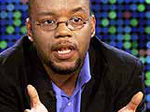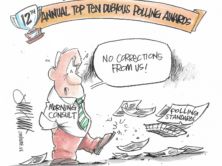
One year ago today, the Associated Press says, “The New York Times announced on its Web site that one of its reporters, Jayson Blair, had ’committed frequent acts of journalistic fraud,’ according to an investigation conducted by the paper.'”
Today, on the website of The Poynter Institute for Journalism, Jill Geisler reports on how leadership ties into promoting ethical behavior and work.
Ethical managers, she says, “know what they stand for and what experience has taught them. If ethical decision-making is a battlefield of ideas, values, and alternatives, they see themselves as the commanding officer — issuing the orders.”
However, she writes, it is not the leader’s job alone to set an example. “Team members” need to form an “army” equipped with “powerful ammunition.”
“Team members shouldn’t ground their reasoning in simply ’what the boss would want.’ They must have a shared sense of values and how they are lived in the organization. They should be able to come up with their own good decisions based on those values.”
This is why, she says, New York Times publisher Arthur O. Sulzberger “was wise to tell editors at the ASNE convention to assume they have a Jayson Blair or Jack Kelley in their organizations. Rogue reporters can and do work for outstanding journalists and journalism organizations.”
Making “countless good calls” on the part of management isn’t always enough. “Internal studies of their organizations pointed up cultural deficiencies that enabled dishonest reporters to deceive their papers and the public for far too long.”
To promote an ethical newsroom culture, Geisler suggests making expecting challenges as part of a routine, and “prosecuting the copy.”
“Question facts, ask for verification, and minimize the use of unnamed sources.” At the same time, she says, be careful not to kill the story with criticism.
Geisler suggests speaking in a way that “encourages ’green light’ thinking” by using words that “define ethical decision-making.”
She encourages introverted people speaking up, and says to “be wary of the perception or reality that ’star performers’ in your organization are held to different standards than others.”
Geisler says that written ethical guidelines should be used more “as part of deeper discussion and decision-making, not as a rulebook. … ’What we did last time’ may not be the best decision for a situation with different dimensions.”
While written codes state what an organization stands for, the leader, whether director or Editor-in-Chief, is “the primary influence on the staff.” The leader’s “works and deeds set the standards” for the other workers, who will look to their leader “for the real story of what matters.” But while a leader should be available for help, she says, but should not do all the work on their own; rather, the team should be able to “make sound decisions on their own.”
She suggests openly discussing concerns about decision-making. Not only the introverted, but the other news sections, interns, and even the maintenance crew should be brought into the discussion of newsroom ethics. “Contacting outside experts and seeking advice is a sign of strength, not weakness.”
And when it comes to new members of the staff, one should consider these ethical points during all steps of employment, “when interviewing, hiring, evaluating, and promoting people. Consider it an essential competency.”
Ethics should be measured, rewarded and celebrated like any other talent, Geisler writes. “Cultures are defined by what they reward and celebrate. They are defined by the stories they tell about themselves, their successes, their failures.”
“Build the standards into your culture. Then it becomes not just ’your way’ but an organizational way of life.”
On Friday, Michael Fisher of California’s Press-Enterprise reported on Associated Press President and CEO Tom Curley’s plans to create “a media advocacy center in Washington, D.C., to fight for open government.”
This push for openness is similar to the standards Poynter advocates.
The Press-Enterprise reports that Curley addressed a crowd of hundreds, including civic leaders, educators, and journalism students at the 38th Hays Press-Enterprise Lecture. “The advocates of secrecy believe security, privacy and public safety are a lot more important than open government,” Fisher quotes Curley as saying. “It’s clear they’re fighting harder than ever to portray the First Amendment as a luxury the country can’t afford right now.”
Fisher reports that in the next few months Curley plans for the AP to “invite representatives from the Society of Professional Journalists, the American Society of Newspaper Editors and other groups to help develop a plan for a Washington office that would lobby for better laws guaranteeing access to government information.”
“An advocacy center for open government would identify and oppose legislation that puts unreasonable restrictions on public information. It would propose and seek legislative support for measures that would strengthen First Amendment values,” Curley said.
Some journalists, Fisher reports, “would disapprove of the media actively backing legislation. But [Curley] said such arguments remind him of the saying about a man ’who was so broad-minded that he wouldn’t take his own side in a fight.’”
Fisher spoke with Jeffrey McCall, a professor at DePauw University in Indiana who writes on media ethics. Fisher quoted McCall as describing Curley’s proposition “a great idea. … If the media doesn’t represent the public sentiment when they take on this initiative, they aren’t going to get anywhere. The public will support open government up to the point where they think their security is at risk.”






